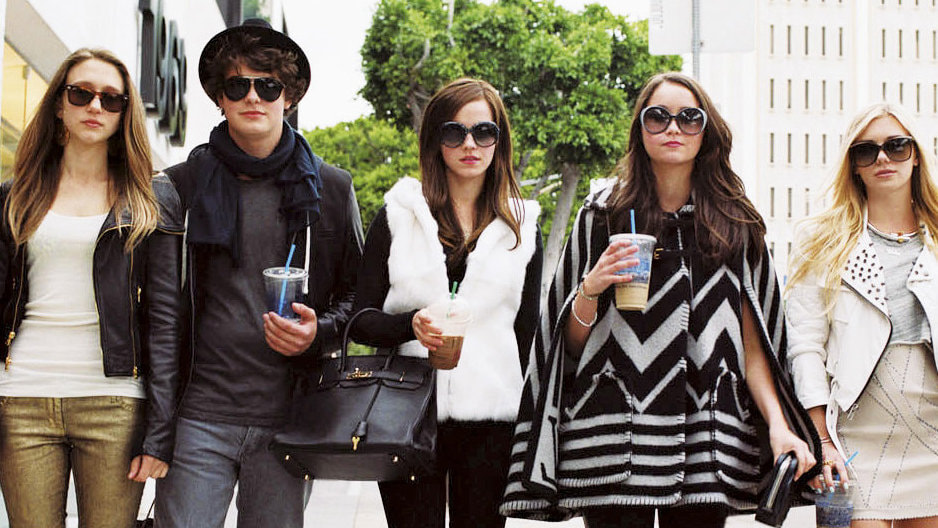|
by Lucas Fink (Image via NPR, sourced from EPK. The Bling Ring is now streaming on Netflix) The Bling Ring is an incredibly frustrating 2013 film written and directed by Sofia Coppola. Sofia Coppola, the daughter of Francis Ford Coppola, also wrote and directed the very good 2003 film Lost in Translation. I am choosing to not celebrate her successes as a filmmaker here and will instead foreground elements of The Bling Ring I found to be crass and problematic. We need not be positive all the time. Sometimes movies are not good. Such is life.
The Bling Ring, based on actual events, is about a group of teenagers who break into the lavish homes of celebrities and steal their things. There are three the film wants the viewer to pay attention to. Mark, solidily acted by Israel Broussard and the only character in the film with some semblance of a moral compass, is the audience stand-in. Rebecca, imbued with disturbing callousness by Katie Chang, is an obsessive, borderline-sociopathic kleptomaniac. Nicki, elevated to the level of pure caricature by Emma Watson, is absurdly conceited and obnoxious. They steal from celebrities, enjoy doing so, and are then caught. Such a premise seems ripe for social critique. How does a culture dominated by spectacle, by celebrity, images, and commodities, a culture in which - to plagiarize a smart French dude Guy Debord - direct experience has been replaced entirely by mere representation and appearances; how does such a culture affect the youth who inhabit it? It’s a really good question. Thankfully, the film never concerns itself with it. Instead, the film spends an hour and a half relishing in how ridiculously stupid and vain its characters are. Look at these stupid and superficial teens! YUCK! Doesn’t their behavior repulse you? Aren’t you nauseated and appalled by the detestable behavior of these stupid teenagers? Can you believe that some stupid teenagers actually did this stuff? Isn’t that insane? Imagine being such a stupid, vapid TEENAGER. I’m sorry if I belabored the “stupid teenager” thing. I just felt the need to make it clear how heartless the film is. It’s not just that its characters are “one-dimensional,” it’s that the film ratchets up the one-dimensionality so much that the characters become literal incarnations of all that is evil and abhorrent and then takes sadistic pleasure in highlighting that evil and abhorrence. I should note here I’m not at all against satire or hyper-exaggerated characters. But satire uses its hyper-exaggerated characters to reveal the contradictions or absurdities of the world those characters live in. The Bling Ring doesn’t do that. Its non-characters aren’t used to criticize consumerism or digital capitalism. Instead, they just exist for you to laugh at and be disgusted by. A VICE News Special in 2014 profiles Alexis Neiers, the member of the “Bling Ring” portrayed by Emma Watson. Alexis had an abusive father in her childhood and was addicted to heroin in her teenage years, when the events of The Bling Ring took place. Alexis now writes for VICE about addiction amongst youth and is a certified substance abuse counselor. As should now be apparent, Neiers is a decent person with nuance and depth and trauma. Most people are. Hence my major qualm: the film individualizes responsibility instead of politicizing it. The film’s answer to “why does everyone seem so superficial and vain now?” is “because they’re just like that.” In the final shot of the film, Emma Watson turns to the camera and says something superficial and vain so the viewer can laugh and go “yeesh; people suck.” People like her are the problem, certainly not larger socio-economic forces. The movie is pretty to look at, though. Watch Lost in Translation.
1 Comment
|
Archives
March 2024
Writers
All
|
